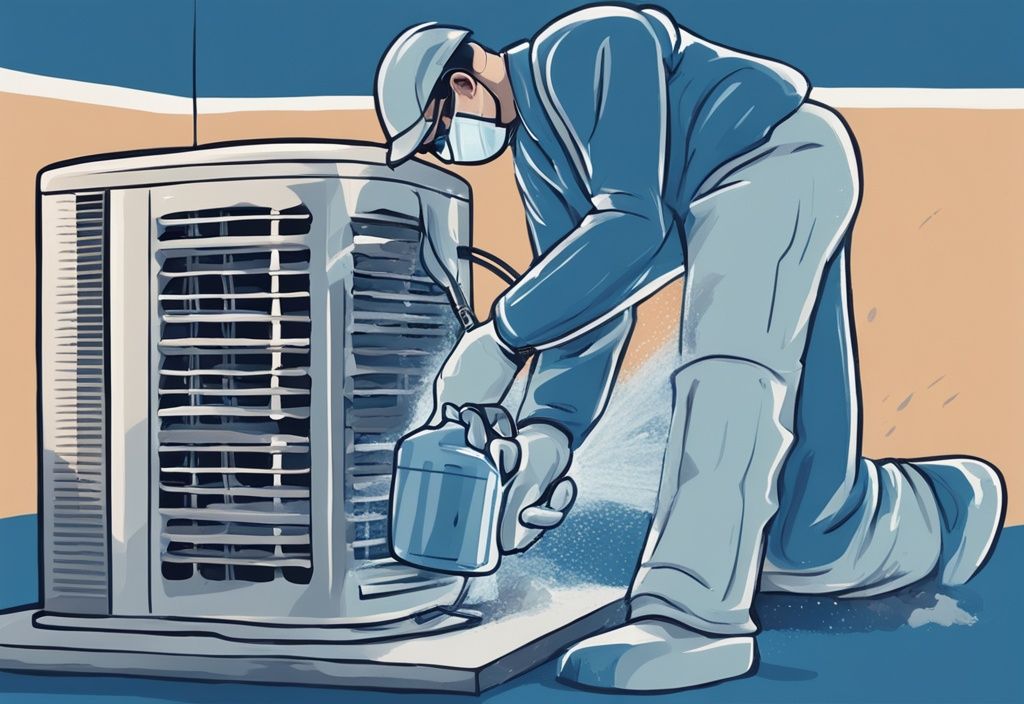Car AC Smells Like Vinegar? Troubleshoot and Fix with Our Guide
Ever cranked up your car’s AC and been greeted with a nose-curling whiff of vinegar? Well, you’re not alone. It’s a common issue that can hint at underlying problems within your air conditioning system. Fear not, though. You’ve got a seasoned HVAC technician on your side – that’s me, John Parker.
In this article, we’ll uncover the mysteries of why your car AC smells like vinegar – be it bacterial build-up or clogged drain tubes. But hey, we’re not stopping there! We’ll equip you with some tried and true solutions and preventive measures. Yes, you’ll soon give that vinegar smell the boot!
So buckle up, take a deep breath (hopefully, sans vinegar smell), and join me as we journey into the world of car air conditioning, ensuring you drive off with a vehicle smelling fresh and clean.
Understanding Why Your Car AC Smells Like Vinegar
If you’ve noticed a sharp, sour smell coming from your car’s AC, you’re not alone. This odor isn’t just unpleasant; it often signals underlying issues in your AC system that need addressing. Let’s explore the common reasons why your car AC might smell like vinegar.
The Role of Mold and Mildew
Mold and mildew absolutely love moist conditions, which makes your car’s AC system their perfect playground thanks to constant condensation. This moisture-laden environment fosters the growth of these tiny organisms, especially if you’re in a humid or rainy area. Over time, their presence can produce that familiar vinegar-like smell. This odor is often due to acetic acid, a byproduct released by certain types of bacteria breaking down within the system.
Moisture Buildup in the AC System
By its very nature, your car’s AC system creates moisture as it cools the air. When humidity levels are high, this builds up even more, providing a great environment for mold and mildew. Running your AC in defrost mode can help to some extent by reducing moisture, but it doesn’t always do the trick completely. To tackle persistent moisture, you might need some extra strategies to keep excess condensate at bay.
The Impact of Organic Material Accumulation
Leaves, dust, and other bits of organic debris often find their way into your car’s AC system, getting trapped and creating a buffet for bacteria and fungi. As these microorganisms munch on the debris, they produce unpleasant odors that fill your car. Regular cleaning of your AC ducts can help a lot with this issue, making sure organic material doesn’t accumulate to smelly levels.
Faulty Drain Tubes and Stagnant Water
Proper drainage is key for any AC setup. If your drain tubes are blocked or faulty, water can’t escape like it should, leading to stagnant water buildup. This standing water becomes a fantastic home for mold and bacteria, which contributes to that vinegar smell. Regularly checking and maintaining these drain tubes is essential. It ensures your system stays free from stagnant water and the resulting odors.
Diagnosing the Vinegar Smell in Your Car AC
Have you ever turned on your car AC and gotten hit with a vinegar-like odor? This annoying problem is not just unpleasant—it’s a sign that something’s up with your AC system. Let’s break down how you can figure out what’s going on.
Identifying the Source of the Odor
- Verification Through AC Operation: First things first, switch off the AC. If the smell goes away and then comes back when you turn it back on, bingo! Your AC system is the main suspect.
- Comprehensive Inspection: Let’s get a bit more hands-on. Check around the vents and other AC components for any signs of dampness or spots that look like mold or bacteria. These troublesome spots are usually where the smell is brewing.
- Odor Intensity: Notice when the smell is at its worst. Typically, you’ll find it’s strongest right when you turn the AC on—those first few seconds of airflow can tell a lot about contamination inside the system.
Inspecting the Cabin Air Filter
- Filter’s Role: The cabin air filter catches all sorts of contaminants. If it’s dirty or clogged, it can become a breeding ground for bacteria, which can cause foul odors like that vinegar smell.
- Regular Inspection: Make it a habit to check the cabin air filter regularly. Keeping it clean and replacing it as needed will help in keeping off any bad smells.
- Professional Advice: When in doubt, consult with a technician. They can guide you on how often you should be changing that filter based on your vehicle’s specific requirements.
Checking the Evaporator Coil
- Vulnerable Component: The evaporator coil is often moist and thus a prime spot for mold and bacteria. When these nasties grow, they can cause that nasty vinegar smell.
- Thorough Inspection: Give the coil a good look. If you see mold or a heavy buildup, that’s a sure sign of where the smell is coming from.
- Cleaning or Replacement: Depending on the extent of contamination, you might need to either clean or replace the evaporator coil to get rid of the smell for good.
The Significance of the Front Passenger Footwell Dampness
- Dampness Indicator: If you notice dampness in the front passenger footwell, it often means there’s a drainage issue affecting the evaporator coil.
- Consequences: This damp environment is just perfect for mold and bacteria growth, leading to that strong vinegar smell.
- Preventive Measures: Regularly check the footwell for any moisture and address drainage problems right away to prevent mold growth and nasty odors.
Low Refrigerant Gas Levels
- Impact on Cooling System: Low refrigerant levels can cause the evaporator coil to freeze and then melt, leading to moisture leaks. These leaks can then promote mold and bacteria growth.
- Warning Signs: Notice a sudden blast of extra cold air followed by a drop in cooling efficiency? That’s a red flag for low refrigerant levels.
- Seek Professional Help: Handling refrigerant isn’t a DIY job. It’s best left to professionals who have the right tools and knowledge to fix it safely.
Solutions to Eliminate Vinegar Smell from Your Car AC
Dealing with a car AC that smells like vinegar can be frustrating, but there are several effective solutions to combat this issue. These methods will help you pinpoint and address the underlying causes, ensuring your car’s AC system remains fresh and odor-free.
Replacing the Air Filter
One of the most common culprits behind that pesky vinegar smell in your car AC is a clogged or dirty air filter. Over time, these filters can trap bacteria and debris, leading to unpleasant odors.

- For a car AC that smells clean and fresh, make it a habit to replace the air filter regularly, following the manufacturer’s recommendations.
- It’s crucial to use the correct type of filter for your vehicle to ensure optimal performance and avoid further issues.
Cleaning the AC System with Antibacterial Cleaners
Another effective way to banish the vinegar smell is by using antibacterial AC cleaners that are specifically designed for cars. Mold and mildew can often take hold within the system, producing that sour odor.
- These cleaners can effectively target and eliminate mold and mildew growth, ensuring thorough disinfection of the evaporator coil and ducts.
- Follow the product instructions carefully for the best results and consider making this a regular part of your AC maintenance routine to prevent odors from returning.
Using Professional AC Cleaning Products with Enzymes
Enzyme-based cleaners are particularly powerful in breaking down organic matter and eliminating stubborn odors from the AC system. Combining these with antibacterial solutions offers a thorough cleaning.
- Use enzyme cleaners to target and destroy the root cause of the odor, ensuring a more comprehensive clean.
- Opt for professional-grade products to achieve a deeper sanitization of your car’s AC system, significantly mitigating the vinegar smell.
Clearing Blocked Drain Tubes
Blocked drain tubes can lead to water accumulation, creating a moist environment perfect for mold growth, which can cause your car AC to smell like vinegar.
- Regularly check and clear the AC system’s drain tubes to ensure proper drainage and prevent water buildup.
- If you find the tubes are blocked, gently use a flexible wire or similar tool to clear the blockage and restore proper function.
Professional Inspection and Maintenance
If the vinegar smell lingers despite your efforts, it might be time to seek professional help. A thorough inspection can uncover deeper issues within the AC system that need addressing.
- Professionals have the tools and expertise to dismantle and clean critical components of the AC system, ensuring all potential sources of odors are eliminated.
- Routine professional maintenance will keep your car’s AC system in top shape and prevent the recurrence of unpleasant smells.
Avoiding Harmful Household Cleaning Products
It can be tempting to use household cleaners on your car’s AC system, but these can damage internal components and pose health risks if inhaled.
- Stick to products specifically designed for automotive AC cleaning to ensure safe and effective results.
- Always follow the manufacturer’s guidelines for cleaning and maintenance to preserve the integrity and smell of your AC system.
DIY Methods to Get Rid of Car AC Vinegar Smell
Running the Fan without AC
Sometimes, it’s the simplest actions that make the biggest difference. Running your car’s fan without the AC on can help air out the system.
- Drying out moisture: Turn on the fan without the AC to help dry out any moisture lurking in the system. This also encourages better air circulation.
- Reducing mold growth: By keeping things dry, you reduce the chance for mold to grow, which is often the sneaky culprit behind that nasty vinegar smell. For tips on how to set up your air conditioner, check out our guide on TCL air conditioner WiFi setup.
- Consistent practice: Make a habit of doing this periodically.
It helps in keeping the environment within the car dryer, thus fending off that annoying vinegar odor over time.
Using Disinfectant Sprays
A handy method to combat that stubborn car AC vinegar smell is to use disinfectant sprays. Choose ones specifically crafted for automotive AC systems.
- Targeting bacteria and mold: These sprays are excellent for targeting and demolishing bacteria and mold, which are typically the source of the smell.
- Proper usage: Always follow the provided instructions to ensure optimal results and safety. Trust me, taking a few minutes to read the label can save you from headaches later.
- Regular routine: Incorporating these sprays into your maintenance routine will help keep the system smelling fresh and free from recurring odors.
Regular Maintenance Tips
Regular upkeep is essential to keep your car’s AC running smoothly and odor-free. Here are some practical tips:

Changing the Cabin Filter
One common, yet often overlooked, task is changing the cabin filter.
- Preventing buildup: Regularly inspecting and replacing the cabin air filter can prevent bacteria and debris from building up—a prime cause of that vinegar smell.
- Effective filtration: Following the manufacturer’s guidelines for air filter changes ensures the filter remains effective in doing its job.
- Improving air quality: A new cabin filter can significantly enhance the overall air quality, reducing odors and creating a healthier environment inside your car.
Drying Out the AC System
Another effective method is ensuring your AC system stays dry. Here’s how:
- Using defrost mode: Switch your AC to defrost mode now and then to help dry out any moisture that might have accumulated. This simple step can reduce mold growth.
- Clearing condensation: Check that the drain tubes are clear and operational so condensation can flow out properly.
- Mold prevention: Keeping the AC system dry is key to maintaining a mold-free environment, efficiently preventing that vinegar-like smell.
Full AC Service Recommendations
Don’t underestimate the value of a full AC service. It covers more than just the basics and tackles potential issues comprehensively.
- Scheduled service: Regularly scheduling full AC services, as recommended by automotive experts, ensures that all components are in top shape.
- Comprehensive check: These services typically include checking refrigerant levels, cleaning coils, and inspecting drain tubes, identifying and addressing problems before they become nuisances.
- Preventing odors: Frequent full services ensure the AC system is functioning as it should, effectively preventing odors caused by common issues like mold and moisture buildup.
Preventive Measures to Ensure Your Car AC Smells Fresh
Maintaining a fresh-smelling car AC isn’t rocket science; it’s all about regular upkeep and smart habits. Let’s dive into some practical steps that can help you keep that dreaded vinegar smell at bay.
Frequent Inspection and Cleaning
- Regularly inspect and clean the AC system: Catching mold or bacterial growth early is key. Regularly check your cabin filter and evaporator coil to keep them free from buildup. This ensures the air flowing through your AC is clean and fresh. For more advanced troubleshooting, such as finding the Lennox air conditioner reset button, refer to our comprehensive guide.
- Prevent mold and bacterial growth: Keeping up with frequent maintenance disrupts the cozy environment mold and bacteria love. This practice is your best bet for a fresh-smelling AC system.
- Consistent inspection schedule: Creating a routine for inspecting and cleaning your car’s AC helps you stay ahead of issues that cause that nasty vinegar smell. Make it a habit and your nose will thank you.
Maintaining Drain Tube Functionality
- Ensure drain tubes are clear: Regularly checking your AC system’s drain tubes prevents blockages that could lead to stagnant water buildup. This is crucial in keeping that vinegar smell away.
- Prevent mold and bacteria: Good drainage stops water from accumulating, cutting down the risk of mold and bacterial growth, which are often the culprits behind that vinegar scent in your car AC.
- Integrate into maintenance: Make sure checking and cleaning those drain tubes is part of your regular AC maintenance routine. It’s a small step that can make a big difference in performance and smell.
Using Anti-Bacterial Sprays
- Regular use of anti-bacterial sprays: Sprays specifically designed for automotive use can kill bacteria and mold within the AC system. This helps in preventing that undesirable vinegar-like odor.
- Maintain a clean environment: These sprays are great for maintaining a clean and odor-free AC environment, improving the overall air quality inside your car.
- Prevent microorganism buildup: Regular application of these sprays helps prevent the buildup of harmful microorganisms that usually cause unpleasant smells.
Ensuring Proper Refrigerant Levels
- Keep refrigerant levels in check: Maintaining optimal refrigerant levels is crucial. It prevents issues like the icing of the evaporator coil which can lead to moisture leaks and unpleasant odors.
- Prevent evaporator coil issues: Proper refrigerant levels ensure the evaporator coil works correctly, reducing the chances of icing and the subsequent growth of mold.
- Professional checks and refills: Having a professional check and refill the refrigerant ensures levels are accurate. This proactive step can prevent future odor problems often linked to a car AC smelling like vinegar.
Conclusion
Identifying and Addressing the Cause of Vinegar Smells in Your Car AC
Understanding why your car AC smells like vinegar is essential for keeping your driving environment comfy and healthy. Mold, mildew, and bacteria love moist conditions inside your AC system. Address issues like moisture buildup, organic material, and faulty drain tubes to keep these pesky odors at bay.
Health Implications and the Need for Regular Maintenance

It’s not just about the unpleasant smells. Mold, mildew, and bacteria in your car’s AC system can be harmful to your health, as they have the potential to cause health problems. For more information on how molds affect people, you can visit the [EPA’s guide on mold and health](https://www.epa.gov/mold/mold-and-health). Prolonged exposure can lead to respiratory problems, allergies, and more. Regular maintenance is crucial for preventing these health risks and keeping your AC system in tip-top shape.
Benefits of Professional Servicing and Preventive Measures
DIY methods and routine cleaning are great, but professional servicing offers a thorough solution. Technicians can take apart critical components, clean the system thoroughly, and fix any hidden issues. Implement preventive measures such as:
- Frequent inspections
- Maintaining drain tube functionality
- Using anti-bacterial sprays
- Ensuring proper refrigerant levels
These steps will help keep your car AC smelling fresh.
With regular upkeep, you not only extend the lifespan of your car AC system but also enjoy a healthier and more pleasant driving experience.
FAQ
Why does my car AC smell like vinegar?
The vinegar smell in your car AC is often due to mold, mildew, or bacteria growing within the system.
These microorganisms thrive in areas where moisture builds up and organic material accumulates. Imagine a damp basement—it’s kind of the same principle.
- Faulty drain tubes can trap moisture, exacerbating the problem.
- A dirty cabin air filter can also contribute by not filtering out organic debris adequately.
Can I use household cleaners to fix the vinegar smell in my car AC?
Household cleaners may seem like a quick fix, but they can actually do more harm than good.
Household products are not designed for automotive systems. They can damage AC components and pose health risks if inhaled.
- Always opt for products specifically made for automotive AC cleaning.
- Antibacterial sprays and enzyme-based cleaners are highly recommended for effective results.
How often should I replace my car’s air filter to prevent smells?
Regularly changing your cabin air filter is key to preventing odors from developing.
Typically, manufacturers recommend replacing the filter every 12,000 to 15,000 miles. However, this can vary based on your driving conditions.
- In polluted or dusty areas, you might need to change it more frequently.
- Frequent checks ensure better air quality and help keep that vinegar smell at bay.
What should I do if the vinegar smell persists despite cleaning?
If the smell doesn’t go away even after a thorough cleaning, it might be time to call in a professional.
An expert can perform a deeper inspection and cleaning of your AC system. There could be hidden issues like faulty drain tubes or significant mold buildup that require professional attention.
- Timely professional maintenance can effectively resolve any underlying problems in your AC system.
How can I prevent the vinegar smell in the future?
Preventing that unwelcome vinegar smell is all about regular maintenance and a few proactive steps.
Keep an eye on your AC system and cabin air filter to ensure everything is in good condition.
- Regular inspections and cleanings are crucial.
- Maintain proper refrigerant levels and ensure drain tubes are not clogged.
- Incorporate antibacterial sprays and enzyme-based cleaners into your maintenance routine.
- Periodically run the fan without the AC to help dry out the system and prevent moisture buildup.




Post Comment